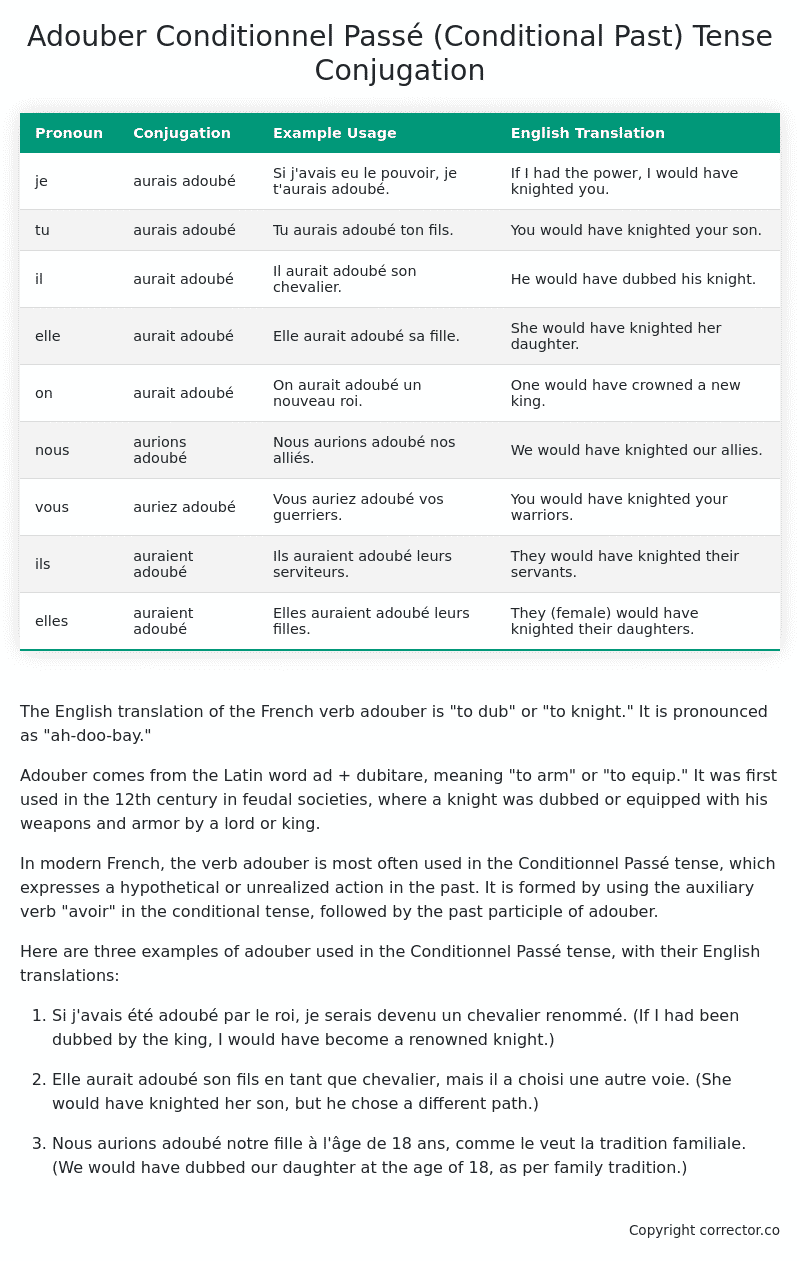Conditionnel Passé (Conditional Past) Tense Conjugation of the French Verb adouber
Introduction to the verb adouber
The English translation of the French verb adouber is “to dub” or “to knight.” It is pronounced as “ah-doo-bay.”
Adouber comes from the Latin word ad + dubitare, meaning “to arm” or “to equip.” It was first used in the 12th century in feudal societies, where a knight was dubbed or equipped with his weapons and armor by a lord or king.
In modern French, the verb adouber is most often used in the Conditionnel Passé tense, which expresses a hypothetical or unrealized action in the past. It is formed by using the auxiliary verb “avoir” in the conditional tense, followed by the past participle of adouber.
Here are three examples of adouber used in the Conditionnel Passé tense, with their English translations:
-
Si j’avais été adoubé par le roi, je serais devenu un chevalier renommé. (If I had been dubbed by the king, I would have become a renowned knight.)
-
Elle aurait adoubé son fils en tant que chevalier, mais il a choisi une autre voie. (She would have knighted her son, but he chose a different path.)
-
Nous aurions adoubé notre fille à l’âge de 18 ans, comme le veut la tradition familiale. (We would have dubbed our daughter at the age of 18, as per family tradition.)
Table of the Conditionnel Passé (Conditional Past) Tense Conjugation of adouber
| Pronoun | Conjugation | Example Usage | English Translation |
|---|---|---|---|
| je | aurais adoubé | Si j’avais eu le pouvoir, je t’aurais adoubé. | If I had the power, I would have knighted you. |
| tu | aurais adoubé | Tu aurais adoubé ton fils. | You would have knighted your son. |
| il | aurait adoubé | Il aurait adoubé son chevalier. | He would have dubbed his knight. |
| elle | aurait adoubé | Elle aurait adoubé sa fille. | She would have knighted her daughter. |
| on | aurait adoubé | On aurait adoubé un nouveau roi. | One would have crowned a new king. |
| nous | aurions adoubé | Nous aurions adoubé nos alliés. | We would have knighted our allies. |
| vous | auriez adoubé | Vous auriez adoubé vos guerriers. | You would have knighted your warriors. |
| ils | auraient adoubé | Ils auraient adoubé leurs serviteurs. | They would have knighted their servants. |
| elles | auraient adoubé | Elles auraient adoubé leurs filles. | They (female) would have knighted their daughters. |
Other Conjugations for Adouber.
Le Present (Present Tense) Conjugation of the French Verb adouber
Imparfait (Imperfect) Tense Conjugation of the French Verb adouber
Passé Simple (Simple Past) Tense Conjugation of the French Verb adouber
Passé Composé (Present Perfect) Tense Conjugation of the French Verb adouber
Futur Simple (Simple Future) Tense Conjugation of the French Verb adouber
Futur Proche (Near Future) Tense Conjugation of the French Verb adouber
Plus-que-parfait (Pluperfect) Tense Conjugation of the French Verb adouber
Passé Antérieur (Past Anterior) Tense Conjugation of the French Verb adouber
Futur Antérieur (Future Anterior) Tense Conjugation of the French Verb adouber
Subjonctif Présent (Subjunctive Present) Tense Conjugation of the French Verb adouber
Subjonctif Passé (Subjunctive Past) Tense Conjugation of the French Verb adouber
Subjonctif Imparfait (Subjunctive Imperfect) Tense Conjugation of the French Verb adouber
Subjonctif Plus-que-parfait (Subjunctive Pluperfect) Tense Conjugation of the French Verb adouber
Conditionnel Présent (Conditional Present) Tense Conjugation of the French Verb adouber
Conditionnel Passé (Conditional Past) Tense Conjugation of the French Verb adouber (this article)
L’impératif Présent (Imperative Present) Tense Conjugation of the French Verb adouber
L’infinitif Présent (Infinitive Present) Tense Conjugation of the French Verb adouber
Struggling with French verbs or the language in general? Why not use our free French Grammar Checker – no registration required!
Get a FREE Download Study Sheet of this Conjugation 🔥
Simply right click the image below, click “save image” and get your free reference for the adouber Conditionnel Passé tense conjugation!

Adouber – About the French Conditionnel Passé (Conditional Past) Tense
Formation
Common Everyday Usage Patterns
Expressing Unreal Past Scenarios
Polite Requests or Suggestions
Expressing Doubt or Uncertainty
Interactions with Other Tenses
Conditional Present
Indicative Past Tenses
Conditional Future
Summary
Want More?
I hope you enjoyed this article on the verb adouber. Still in a learning mood? Check out another TOTALLY random French verb conjugation!


